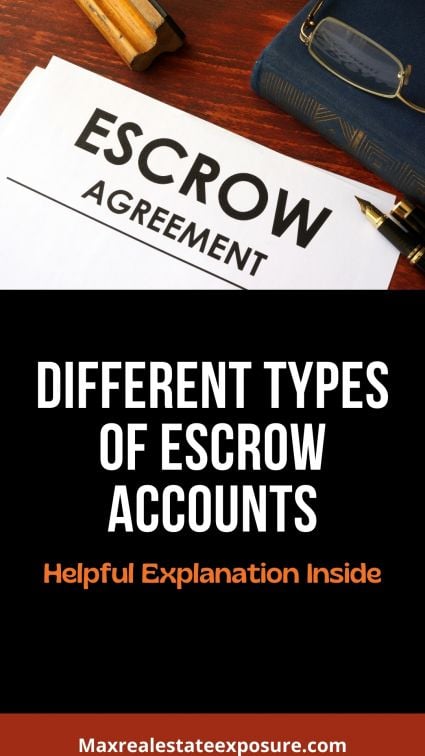 Are you wondering what escrows are in real estate? You’re not alone. Many prospective homebuyers wonder what escrow money is and how it works.
Are you wondering what escrows are in real estate? You’re not alone. Many prospective homebuyers wonder what escrow money is and how it works.
You will likely encounter the word “escrow” when buying a home. It can mean different things during the buying process and once you own the property.
Knowing what escrows are and how they will affect you is something you should know before making a house purchase.
It is unlikely you’ll enter into a real estate transaction without escrow. Escrow funds are the glue that ensures parties in a transaction keep up their end of the contract.
Real estate agents often say a home is “in escrow” when a home is pending or contingent. A buyer and seller have executed a real estate contract in both cases.
We will look at real estate escrow and how it can benefit you without ignoring the downsides. Escrow means different things depending on the circumstances of the transaction.
From experience of being a Realtor for the past three decades, many buyers do not completely understand the escrow process and how it impacts homebuying.
We will cut through all the noise to give you an easy understand picture on how it will impact your road to homeownership.
Escrow Definition
The meaning of escrow in real estate is when a third party holds money or property until certain things happen, agreed to by contract.
The third-party managing the escrow helps to ensure protection for both sides of the home purchase.
The use of escrows can benefit both buyers and sellers during a home sale. An escrow account can also be called an impound account.
Who Holds Escrow Money?
In a real estate transaction, one of four parties can hold escrow funds on a homebuyer’s behalf. They include the following:
- Real Estate Brokers
- Real Estate attorneys
- A title company
- A designated escrow agent or escrow company
The buyer gives escrow when writing an offer or upon acceptance.
Noteworthy Facts and Statistics
1. Escrow is a financial arrangement where a third party holds and regulates the funds or assets in a real estate transaction.
2. In real estate, escrow is a neutral intermediary between the buyer and seller to ensure a secure exchange of property and money.
3. Typically, the buyer deposits the earnest money into an escrow account to show good faith during home-buying.
4. It ensures that all conditions of the sale are met before releasing the funds, and transferring the property title helps protect both parties.
5. The escrow agent distributes the funds accordingly and completes the transfer of ownership once all obligations have been fulfilled.
6. Approximately 95% of home sales in the United States involve using escrow.
7. The average time for escrow to close on a residential property is around 30 days.
8. Over 90% of homebuyers opt for escrow services to protect their interests during the buying process.
9. Escrow companies typically hold an average of $1.2 million in escrow accounts.
10. Research shows that escrow reduces the risk of fraud in real estate transactions by over 70%.
How Does Escrow Work?
During the house-buying process, the buyer and seller must meet certain contingencies to fulfill the purchase agreement, which could result in holding money in the account.
Additionally, while a borrower has a mortgage, an escrow account will have funds for homeowner’s insurance and property tax payments.
The parties in a real estate transaction use escrow to protect themselves and ensure they follow their obligations.
What Are Escrow Payments?
An escrow payment is money disbursed based on a real estate transaction agreement.
Earnest Money is Escrowed
For example, in many real estate transactions, the seller’s agent will hold earnest money in escrow until the sale is completed. The buyer will state in the purchase contract how much money they will place into the escrow account.
Part of the process is accounting for these funds at closing. The escrow provider will do this.
The escrow holder could also be a title company considered a neutral third party. Your state often determines whether a real estate agent or title company holds the monies in an impound account.
If a title company holds the funds, an escrow officer will be assigned to the transaction.
When you have a mortgage to cover property taxes and homeowner’s insurance, you can also escrow money in an account. The account holds this money until the bills become due, spreading the cost throughout the year.
So, an escrow account can have multiple purposes.
What is an Escrow Account?
There are various types of accounts for holding escrows.
 It is a good idea to know the types of escrow accounts.
It is a good idea to know the types of escrow accounts.
They have two primary uses when buying or owning a home: for the buyer’s earnest money deposit or to hold money for insurance and tax payments.
Home Buying Escrow Accounts
When you buy a house, you must provide a deposit to show the seller good faith.
This good faith or earnest money deposit protects the seller if the buyer breaches the contract. It gives them peace of mind a homebuyer won’t back out on a whim.
Suppose the buyer decides they don’t want to continue with the purchase, which isn’t covered by any real estate contingencies. In that case, the seller usually gets to keep the earnest money deposit.
But if things move forward successfully, the deposit the buyer has paid will go towards their down payment.
This deposit protects the seller, and using escrow protects the buyer.
Using a third party to manage the account means the buyer doesn’t pay the money directly to the seller. Otherwise, there could be potential problems if the buyer needs to get their deposit back from the seller.
Disbursement of Escrows Explained
There could be animosity between the buyer and the seller, leading to the seller not releasing the deposit as they should.
The good faith deposit will remain in the account until the transaction closes or the contract ends. The money can complete the escrow account either by going towards the down payment or to the seller if the buyer has broken the contract.
Occasionally, there is a need for what is known as an escrow holdback. This is when funds are added to escrow by the buyer because the seller still needs to do something.
The final walk-through may have identified a problem, and the seller is responsible for the repairs. Both parties can also utilize this option when they have agreed to allow the seller to remain in the home for a short period after closing.
Escrow can also be used if you are having a new home constructed. The money can remain in the account until you are happy with the work and can be released to contractors.
From years of experience working with builders, I know an escrow holdback can be vital. Unfortunately, some builders overpromise and underdeliver.
What is Escrow For a Mortgage?
 After closing the property, your mortgage lender may require an escrow account for property tax and home insurance.
After closing the property, your mortgage lender may require an escrow account for property tax and home insurance.
It’s called mortgage escrow.
Tax and insurance payments will be added to your monthly mortgage payments and then deposited in a mortgage escrow account until these payments are due.
However, property taxes and insurance premiums can change every year. While your lender will calculate your escrow payments based on last year’s figures, this might not be enough.
For this reason, lenders usually require a couple of months of extra payments in your escrow account to cover any real estate taxes or insurance increases.
Lender Like to Have a Mortgage Escrow Cushion
Lenders do not want to end up with an escrow shortage.
People often refer to the additional monthly escrow payments as having a minimum balance to cover what they must pay
Typically, your mortgage lender will check the escrow account every year to ensure there is enough to cover the bills or to ensure you aren’t overpaying.
You might even get a refund if you are substantially in credit.
While a refund like this will be a pleasant surprise, you could also get a more unpleasant result when the lender checks your account.
It might be the case that you haven’t paid enough money, and you will need to make up the difference.
You might get the option to pay a one-off fee, or they will increase your monthly mortgage payments.
The escrow requirement can be different from lender to lender. Some will do an annual escrow analysis. At the end of the year, adjustments can be made for the following year.
What is an Escrow Balance?
The escrow balance is the money in your account for payments the mortgage lender will make. The balance accounts for amounts you deposited into the account, less any deductions for paying property taxes and insurance.
Bills That Are Not Covered
An account will only cover ongoing property taxes and homeowner’s insurance. If you find yourself with a one-time tax bill thanks to the change in ownership or new construction, it isn’t going to come out of the escrows.
Utility bills and homeowners association fees will also be your responsibility and will not be paid for by the account. Remember this if you are purchasing where there is an HOA.
Can You Choose Not to Have an Escrow Account With Your Mortgage?
It is possible to take responsibility for paying homeowners insurance premiums and property taxes yourself, sometimes. This has the benefit of reducing your monthly payment, but you’ll need to make sure you have enough money saved for the taxes and insurance when they become due.
You might only be allowed to avoid having an escrow account if you meet specific criteria. Generally, with conventional loans, you need a down payment of 20% or more to have the option.
Mortgage Types Can Affect Escrows
The type of mortgage you’re using will also affect the requirements. A conventional mortgage gives you an excellent chance to have the ability not to escrow for insurance bills and real estate taxes.
If you get a loan through the VA, you’ll need a good credit score and 10% down. It will be unlikely that the escrow account requirement will be waived for VA loans with no down payment.
If you are getting your mortgage through the FHA loans program, you must have an escrow account, whatever your situation. The Federal Housing Administration will want a portion of your monthly mortgage payment toward escrows.
Some lenders will only need escrows for some of these expenses. Perhaps they will only require paying property taxes from an account, for example.
Having Escrow For Private Mortgage Insurance
When you put in less than a 20 percent down payment, you will likely be required to pay PMI, which protects the lender if you default. PMI stands for private mortgage insurance. These insurance premiums lower the risk for mortgage lenders in the housing market.
Lenders will require that you escrow your PMI payments monthly. There are ways to avoid paying PMI if you choose.
Having Escrows For Flood Insurance
If the home you are buying requires flood insurance, the lender will undoubtedly require an escrow account for payment.
As of January 1, 2016, lenders must have escrows for flood insurance. There are some exceptions made for small lenders.
You’ll need to check with the service provider you’re using, but plan to pay into an account for flood insurance.
How Are The Accounts Managed?

Let’s look at who manages these accounts:
Escrow Companies
An escrow company or agent could manage your account during the home-buying process.
Mortgage servicing companies are sometimes known as these, and they might also fulfill a title company’s role.
Not only will an escrow company be the third party to manage escrowed money, but they could also hold on to the deeds and other important documents.
Typically, the fee for these services is split between the buyer and the seller since they both benefit from it.
A Mortgage Loan Servicer
A mortgage servicer will deal with the administration of your mortgage. This will be from closing on the home until the loan has been paid off.
The servicer has to deal with making sure you pay on time, as well as managing the escrows.
Often, your lender will also be the servicer of your account. However, your lender might sell the rights to service your loan to another company. This could lead to more considerable charges to manage your account, so you should know the fees before you take the mortgage.
Lenders must detail monies held in escrow as part of the loan estimate, including all closing costs. The closing process cannot happen without doing so by law.
Borrowers also get their breakout of the expenses in their loan documents.
The servicer will handle the property tax and homeowners insurance, so you don’t need to worry about when these bills are due. However, you must let the mortgage loan servicer know if you switch to another insurance company.
Doing so will allow them to update their policy information and pay the insurance premium on time.
The Advantages of Escrows
As with most things, an escrow agreement has pros and cons.
Placing money in an account has different benefits at different times during the home-buying process and afterward. It offers you some protection when you are either buying or selling a home.
When you’re a homeowner, it makes sure you have property taxes and homeowners insurance covered.
Benefits to Home Buyers
When buying a home, your escrow account will hold your deposit so that you can get this money back should contingencies give you the option to back out.
Perhaps you have a home inspection contingency, and the inspector uncovers major structural issues. This could lead you to not want to continue the process and buy the home.
If you handed over your deposit to the seller, you could have problems getting that money back. However, holding the money in an account overseen by a third party avoids this problem.
When there is a dispute about escrows the holder of the funds cannot release any money without both party's consent.Click To TweetBenefits For Homeowners
A large lump sum is generally required for the tax bill and insurance premiums, but paying into an account monthly removes the shock of a hefty bill.
Spreading the payments out over the year makes it easier to budget without worrying about huge bills around the corner.
It will also ensure you pay on time since your lender will take full responsibility. This means you don’t have to worry about late payments that could affect your credit score or incur extra fees.
Even if there isn’t enough money in your account, you don’t have to worry, as the bank will cover it (though you will have to make this up later).
Benefits For Lenders
Homeowners are required to have impound accounts because they benefit their lender. A lien could be placed on the property if you fail to pay your property tax. This could lead to foreclosure, which could get expensive for the lender.
Without homeowners insurance, the lender could lose significant money if the home suffers severe damage. Escrows ensure these bills are paid on time, protecting the lender.
The Disadvantages of Escrows
Most of the downsides of having escrows fall on the homeowner. It means higher monthly mortgage payments, taking money from your account that you could otherwise invest or spend.
There is also the problem of estimates being wrong. Since the cost of your property taxes or homeowners insurance is likely to change, you could find yourself with an unexpected bill even when you have been paying more each month.
Your monthly payments will be based on the previous year’s tax and insurance costs.
While this is just an estimate, it can be a long way off. When you first move in, the assessor will probably reassess your home, which could significantly increase the property taxes due.
Increases in property taxes can happen for the first few years of home ownership before things settle down.
Since the escrow amount is reassessed yearly, you can’t guarantee that the monthly payments will stay the same. It will increase if there isn’t enough to cover the bills and only go down if you’ve been overpaying.
How Are Impound Accounts Regulated?
The governing body that oversees mortgage lenders’ escrow accounts is the Consumer Financial Protection Bureau. It is found under S 1024.17 Escrow Accounts.
Escrow Near Me
If you are selling for sale by an owner with no real estate agents involved, you may need escrows held by a neutral party. You can search for an escrow company online for escrows near me or escrow companies near me.
Undoubtedly, you’ll get some companies that can hold the earnest monies during your transaction. When there is no Realtor involved, you can and should have escrows. You’ll still want to have your interests protected.
An escrow company, agent, attorney, or mortgage servicer can manage escrows to protect both sides of the transaction.
There still can be escrows when there is no mortgage, as well. If a buyer pays for your home, insist on the typical deposit amount.
Escrow companies near you can handle this as part of your home sale.
Closing Thoughts on Escrows
You could have to deal with escrows in a few different ways when buying a home. It can help protect your earnest money deposit when buying, making paying taxes and insurance premiums easier and more manageable.
When you own the home, you must often have an escrow account. But there is sometimes the option to deal with the tax and insurance yourself.
Often, if you put more money down, one of the benefits will be forgoing escrows. Whether this is an option depends on the home loan you are applying for.
You might like not having an impound account and dealing with the tax and insurance yourself, but there are some downsides.
Homeowners will find a lower monthly mortgage payment attractive but must pay these large bills on time.
If you have any questions on something to do with escrows, you may consider reaching out to a real estate attorney for legal advice.
Hopefully, it would help if you now had a much better understanding of the importance of escrows in real estate.
FAQs
Here are some frequently asked questions and their respective answers on escrow services.
What is The Role of an Escrow Agent?
An escrow agent plays a crucial role in real estate transactions. Acting as a neutral third party, the agent ensures a smooth and secure transfer of funds and documents between the buyer and seller.
They hold the buyer’s earnest money deposit in an escrow account until all conditions of the sale are met. Once both parties fulfill their obligations, the agent releases the funds to the seller and facilitates the transfer of property ownership.
This process protects buyers and sellers, ensuring all agreement terms are met before the transaction is finalized.
The escrow agent’s expertise and attention to detail help minimize risks and ensure a fair and transparent real estate transaction for all parties involved.
Can I Cancel an Escrow Agreement Once it is Initiated?
In most cases, neither party can unilaterally cancel an escrow agreement once they initiate it in a real estate transaction. Escrow agreements are legally binding contracts designed to protect the interests of both the buyer and the seller.
However, there are certain circumstances where cancellation may be possible, such as if both parties mutually agree to terminate the agreement or if one of the parties has breached the contract.
It is essential to consult with a real estate attorney or escrow agent to fully understand your escrow agreement’s specific terms and conditions and any potential options for cancellation.
What Are Some Common Pitfalls With The Closing Escrow Process?
There are a few common pitfalls that buyers and sellers should be aware of. One is the risk of fraudulent escrow services. Ensuring you work with a reputable and licensed escrow company is crucial to avoid falling victim to scams.
Another drawback to watch out for is the possibility of delays in the escrow process. This can occur due to various reasons, such as incomplete documentation or issues with financing.
To mitigate this risk, both parties must stay proactive and communicate effectively throughout the escrow period. Lastly, unexpected costs can also be a potential pitfall in escrow.
Are There Any Legal Requirements For Opening an Account?
Yes, legal requirements exist for opening an escrow account in real estate transactions. The specific requirements may vary depending on the state, but generally, the process involves several key steps.
A licensed professional authorized to handle escrow accounts must be the escrow agent. The parties involved, such as the buyer, seller, and lender, usually require a written agreement outlining the terms and conditions of the escrow arrangement.
In addition, regulatory bodies may govern the types of funds the escrow agent can hold and how the agent should manage them.
Finally, the escrow agent must typically fulfill regular reporting and record-keeping obligations to ensure transparency and accountability throughout the transaction.
About the Author: Bill Gassett, a nationally recognized leader in his field, provided information on what escrow is in real estate. He is an expert in mortgages, financing, moving, home improvement, and general real estate.
Learn more about Bill Gassett and the publications he has been featured in. Bill can be reached via email at billgassett@remaxexec.com or by phone at 508-625-0191. Bill has helped people move in and out of Metrowest towns for the last 38+ years.
Are you thinking of selling your home? I am passionate about real estate and love sharing my marketing expertise!
I service Real Estate Sales in the following Metrowest MA towns: Ashland, Bellingham, Douglas, Framingham, Franklin, Grafton, Holliston, Hopkinton, Hopedale, Medway, Mendon, Milford, Millbury, Millville, Natick, Northborough, Northbridge, Shrewsbury, Southborough, Sutton, Wayland, Westborough, Whitinsville, Worcester, Upton, and Uxbridge MA.


Hi Bill, I learned the negative of having escrow years ago. The city I lived in did not take out the taxes and I got a big increase in my mortgage for a year afterward. Never again did I go with the escrow route. Great article for those trying to make a decision of which way to go!
Good move Lisa. I always do my own escrows for taxes and insurance.